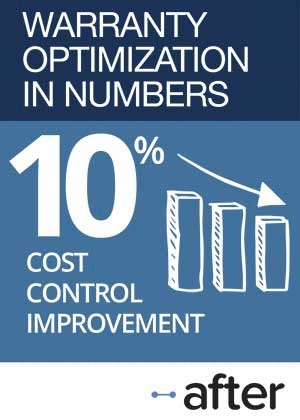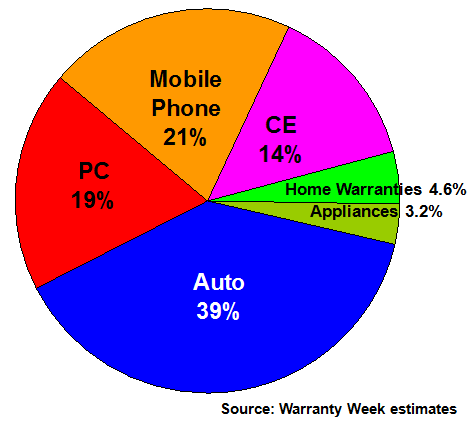September 19, 2013 |

|
ISSN 1550-9214 |
Extended Warranty Image Problems, Part 1:Service contract professionals, their customers, and the media can't seem to agree on what to call these warranty extensions. And the terms the experts prefer to use are far from the most popular. Even the regulators aren't very consistent with their language and terminology.At the Fourth Annual Extended Warranty & Service Contract Innovations Conference earlier this week, the industry's image problem was a major topic. First, there is widespread disagreement over the very name of the industry, starting with the name of the conference itself. Are we here for extended warranty? Or are we here for service contract? Are we both? And does that mean they're separate and different things? Second, there's the ongoing disagreement over whether service contracts are or are not a form of insurance. For multiple decades, they were not, although most of the companies that actually administer the programs were backed up by contingent liability insurance policies (CLIPs), and even though they shared terms such as claims, premiums, and obligor with the insurance industry. But then along came Accidental Damage from Handling, which covers spills, drops, and other perils that have nothing to do with defects, and which therefore blurs the line between warranty and insurance. And now the mobile phone carriers sell plans that cover not only defects and damage, but also theft and loss. And third, but possibly most importantly of all, the image of the extended warranty industry in the popular media is so bad that most providers now avoid the term completely. Some avoid the term "extended warranty" for purely legal reasons, but others prefer alternatives such as "protection plan" or "extended service contract" simply to avoid the negative connotations of those two words. Service Contracts or Extended Warranties?The conference brought roughly a hundred extended warranty and service contract professionals to the Hermitage Hotel in Nashville for a day and a half of presentations and panel discussions. And the controversy began almost immediately when the Warranty Week editor said he uses the terms sloppily and interchangeably, though sometimes specifically for a certain type of product coverage. A "home warranty," for instance, is usually purchased at some point during the sale of an existing home, covering the major appliances and the heating/cooling system against mechanical breakdowns. Usually it's bought by the home seller at the behest of the realtor, to attract a buyer. The theory is that a home warranty basically gives the buyer of an existing home some peace of mind that they're not buying a "money pit," and they won't soon be facing major repair costs for the appliances and HVAC systems. There's usually an annual premium plus a per-call deductible paid by the homeowner. A "vehicle service contract" is usually sold by an auto dealer to cover additional years above and beyond the manufacturer's warranty. The premium is usually paid at the same time and place as the vehicle is purchased, though sometimes the premium is added into the finance package or is structured in some other way so it can be paid monthly. And then there are the retailers that sell service contracts that cover specific products, one at a time. Let's call these component service contracts for appliances and electronics. Consumers walk into Best Buy or Sears, and walk out with a box and some sort of repair plan, protection plan or service plan. U.S. Market SizeThey're all extended warranties, and then again they're not. But either way, no matter what it's called, it's already a huge business, as the editor detailed to the conference attendees. This year, car buyers in the U.S. are expected to spend almost $14.7 billion on vehicle service contracts. Mobile phone customers will spend almost $8 billion on their handset insurance plans. Computer buyers will lay out over $7 billion for product protection plans of one sort or another, with major manufacturers such as Dell commanding upwards of $2 billion apiece. And then consumer electronics buyers will spend an additional $5.2 billion on service contracts, purchased primarily from retailers such as Best Buy and Wal-Mart. Homeowners will spend $1.8 billion covering their appliances with home warranties bought from American Home Shield and others, and an additional $1.2 billion covering them one product at a time through service contracts sold by Sears, Lowe's, and others. Figure 1 |
||||||||||||||||||||||||||||||||||||||||||||||||||||||||||||||||||||||||||||||||||||||||||||||||||||||||
| Word or Phrase | Pages Found |
| Limited Warranty | 19,700,000 |
| Manufacturer Warranty | 18,500,000 |
| Factory Warranty | 10,600,000 |
| Extended Warranty | 10,400,000 |
| Implied Warranties | 8,390,000 |
| Manufacturer's Warranty | 8,100,000 |
| Service Plan | 7,490,000 |
| Limited Manufacturer's Warranty | 5,910,000 |
| Protection Plan | 5,740,000 |
| Home Warranty | 5,550,000 |
| Service Contract | 4,660,000 |
| Manufacturers Warranty | 4,280,000 |
| Manufacturers' Warranty | 4,270,000 |
| Product Warranty | 3,330,000 |
| Extended Warranties | 2,750,000 |
| Extended Protection Plan | 2,270,000 |
| Car Warranties | 1,040,000 |
| Extended Car Warranty | 802,000 |
| Protection Agreement | 783,000 |
| Home Protection Plan | 709,000 |
| Extended Service Agreement | 555,000 |
| Product Maintenance Contract | 517,000 |
| Vehicle Repair Coverage | 412,000 |
| Express Warranties | 313,000 |
| Extended Auto Warranty | 297,000 |
| Extended Auto Repair Warranty | 279,000 |
| Extended Service Contract | 217,000 |
| Mechanical Breakdown Insurance | 110,000 |
| Vehicle Service Contract | 78,300 |
| Car Repair Insurance | 33,100 |
| Mechanical Breakdown Protection | 22,500 |
| Mechanical Repair Coverage | 6,040 |
Note that among the permutations for manufacturer's warranty, with or without the apostrophe and with or without the plural, the term "manufacturer's warranty" with the apostrophe was twice as popular as "manufacturers warranty" was without one. And "manufacturers' warranty" with both the plural and the apostrophe was the least popular of the four. However, "manufacturer warranty," without either the apostrophe or the plural was twice as popular as any of the others. So bad grammar wins, at least on the Internet.
Note also that "extended warranty" was the clear leader among the service contract-related phrases. In fact, "service contract" was actually fifth, behind not only "extended warranty" but also behind "service plan," "protection plan," and "home warranty."
"Vehicle service contract," meanwhile, came in a miserable 29th on the list, with less mentions than even "mechanical breakdown insurance," which we thought was a phrase only an insurance commissioner could love. Even clumsy terms such as "extended car warranty" and "vehicle repair coverage" were more popular than the term favored by the professionals. So on Google, at least, things are not going according to plan.
Industry Association Renamed
And then there are those entities that overtly avoid using the term "extended warranty." Back in 2008, when the US Fidelis scandal was first beginning to dominate the headlines, and the state attorneys general were first beginning to take action, a group of industry professionals formed the Automotive Warranty Services Association in an attempt to self-regulate. Then to broaden their focus, they changed their name to the Automotive Warranty & Service Contract Association.
Eventually, they changed their name to the Vehicle Protection Association, completely dropping the word warranty from their name. In addition, the Code of Conduct they eventually created actually forbids members from referring to vehicle service contracts as either warranties or extended warranties. VPA members may use the term "warranty" only in reference to the manufacturer's warranty.
However, the VPA, in recognition of the consumer confusion over the industry terminology, as well as the legacy of old marketing materials, still allows its members to refer to vehicle service contracts as "formerly known as an extended warranty" or "commonly referred to as an extended warranty," as long as they also include the following disclosure:
A Vehicle Service Contract (VSC) is often referred to as an "extended warranty," but it is not a warranty. A VSC does, however, provide repair coverage for your vehicle after the manufacturer's warranty expires. A VSC is a contract between you and a VSC provider or administrator that states what is a covered repair and what is not.
If applicable, the VPA member must also include this sentence:
[Company name] is a marketer of VSCs and does not sell warranties. VSCs sold by [Company name] are agreements between consumers and third party VSC providers, not [Company name].
Meanwhile, the Service Contract Industry Council and the National Association of Insurance Commissioners have done a remarkable job of defining what service contracts are, as well as what they are not: in general, across the U.S., they are not usually classified or regulated as insurance contracts.
However, most of the contracts are backed up by contingent liability insurance policies. And they're usually regulated in some fashion by each state's department of insurance. In fact, many states require the contracts to be backed up by CLIPs, or else the administrator must meet some other minimum financial requirements (such as posting a bond).
Most times, the laws promoted by the SCIC and NAIC allow the sellers of service contracts to avoid the more onerous aspects of insurance regulations as long as there's an insurance company backing them up in some fashion. Some states make the companies register, or open a local office. In other words, they can avoid having to comply with the much tougher insurance rules if they comply with the alternative rules for service contracts. And if they don't comply, then they're selling insurance without a license.
Terms and Conditions
Most times, the terms and conditions of the service contracts include some explicit language regarding this point. For instance, "This plan is not an insurance policy, however, our obligations under this plan are insured under an insurance policy issued by [name of insurance company.]" Or another: "This is not a plan of insurance. Obligations of the obligor under this plan are insured under a service plan reimbursement insurance policy issued by [name of insurance company.]"
Therefore, somewhat paradoxically, the service contracts aren't considered to be insurance as long as they're backed up by insurance. And that's done so that state insurance regulators don't have to deal with poorly-run administrators who go out of business when their expenses exceed revenues, taking their worthless contracts with them to the bottom. That causes consumer complaints.
Historically, the regulation of insurance contracts in the U.S. has been done at the individual state level, rather than at the federal level. But as attorney Brian Casey of Locke Lord LLP pointed out in his presentation at the Extended Warranty & Service Contract Innovations Conference, if service contracts aren't insurance, then their regulation isn't reserved to the states only.
Therefore, technically, if they're not insurance, they also can be regulated at the federal level, by entities such as the Federal Trade Commission, the National Labor Relations Board, the Securities and Exchange Commission, or perhaps the new Consumer Financial Protection Bureau.
Consumer Complaints
Angie's List is a website that collects and publishes consumer reviews of the best and worst local service providers they encounter. Year after year, home warranty companies top the list of the worst-graded categories, beating out Internet service providers, banks and credit unions, mattress salesmen, and wedding planners.
In 2011, 46% of the consumer reviews submitted by Angie's List members who'd bought a home warranty and reported on their experience gave their service provider poor grades -- either a D or an F grade overall. At the other extreme, piano tuners and ceiling fan installers were among the least complained about.
The point is, service contracts generate complaints. And complaints attract attorneys general and other regulators. And that can lead to new laws, and new regulations. So complaints are bad for business in general. And doing anything that attracts the attention of the Consumer Financial Protection Bureau would be very bad for business.
And then there are the semi-public entities such as the FASB or the Financial Industry Regulatory Authority Inc., to which the government regulators look for advice and guidance. They also can develop rules that impact the sellers and administrators of service contracts. And as with the FASB TB 90-1 language, they also can add confusing terminology into the mix.
New Accounting Rules
It gets worse. As was mentioned earlier, we wrote about the FASB rules in the February 7, 2013 newsletter. And in that newsletter, we explained how Technical Bulletin 90-1 has now been superseded by the FASB's Accounting Standards Codification Topic 605 on Revenue Recognition.
However, that new document, rather than clarifying the terminology, seems to add to the confusion. For instance, while ASC 605 recognizes that extended warranties aren't insurance contracts, is also states that "accounting for extended warranty and product maintenance contracts follows an approach similar to that described in [another ASC subsection] for short-duration insurance contracts. Like short-duration insurance contracts, extended warranty and product maintenance contracts provide coverage against the risk of certain specified claim costs for a specified period."
So it looks like a duck, and it quacks like a duck. But it's not a duck.
ASC 605, section 20-25-1, in fact, not only repeats some of the same phrases as TB 90-1 but adds contextual definitions to the mix: "Separately priced contracts for extended warranty and product maintenance contracts provide warranty protection or product services ..." Oops, did they just say that service contracts provide warranty protection?
So there we have it. Before we can even get around to a discussion of the image problem the industry suffers in the media and with consumers, there's an image problem with the basic terminology we all use to describe what we sell. And then there's an image problem with the regulations and the regulators, which is only going to get worse as mobile technology and social media become more prevalent in the sale and delivery of protection plans, blurring the lines between advertising, telecommunications, insurance and retailing even further.
Some entities provide clarity, while others merely add to the confusion. Warranty Week is going to aim for clarity. From now on, in our reporting, we're going to try to stick to the two terms "manufacturer's warranty" and "service contract" to differentiate the free guarantee from the extra protection. But we know we're going to slip up once in a while, as we've been doing for more than a decade.
Please tell us what industry terms you prefer.

|
This Week’s Warranty Week Headlines | ||
|
Cross Country Home Services forms partnership with Ferguson Enterprises. Press Release, September 19, 2013 | ||
|
Warranty Wise to bring back the Lister Motor Company Ltd. Top Gear, September 19, 2013 | ||
|
Letter: The personal touch from Home Depot. Verde Independent (Arizona), September 19, 2013 | ||
|
Is home warranty company responsible to replace A/C unit? KMIR-TV Palm Desert CA, September 17, 2013 | ||
|
Onex preps sale of The Warranty Group, hires Morgan Stanley. Reuters, September 17, 2013 | ||
More Warranty Headlines below | ||

|
Warranty Headlines (cont’d) | ||
|
Be wary of offers of lifetime warranties. Hamilton (Ontario) Spectator, September 16, 2013 | ||
|
Investigation leads to state charges against Sensible Home Warranty LLC. KUTV-TV Salt Lake City, September 13, 2013 | ||
|
Top iPhone 5S insurance & warranty options compared. Gotta Be Mobile, September 13, 2013 | ||
|
When is a "lifetime warranty" good for a lifetime? WJXX-TV Jacksonville FL, September 13, 2013 | ||
|
Truck warranty survival guide. Today's Trucking, September 12, 2013 | ||
More Warranty Headlines below | ||

|
Warranty Headlines (cont’d) | ||
|
SquareTrade launches Protect My Phone mobile application Press Release, September 12, 2013 | ||
|
Which? rates Currys and PC World worst in extended warranty mystery shopping. Daily Mail (UK), September 12, 2013 | ||
|
National Auto Care Corp. and Family First Dealer Services LLC to merge. Press Release, September 12, 2013 | ||
|
Marne Martin appointed CEO of ServicePower Technologies plc. Press Release, September 11, 2013 | ||
|
Wichita City Council refuses to endorse sewer and water line warranty program. Wichita KS Eagle, September 10, 2013 | ||
More Warranty Headlines below | ||

|
Warranty Headlines (cont’d) | ||
|
Apple raises AppleCare+ iPhone service charge from $49 to $79. Mac Rumors, September 10, 2013 | ||
|
Seeking vital signs in a lifetime warranty. New York Times, September 7, 2013 | ||
|
4 best credit cards that offer free extended warranty in 2013. Daily Markets, September 5, 2013 | ||
|
Rethinking high-end fly rod warranties. Field & Stream, September 5, 2013 | ||
|
Bonded Builders Warranty Group appoints national sales director. Press Release, September 5, 2013 | ||
More Warranty Headlines below | ||

|
Warranty Headlines (cont’d) | ||
|
Jennifer Convertibles extended warranty excludes cracking and peeling. WRCB-TV Chattanooga TN, September 5, 2013 | ||
|
Staples to resell SquareTrade's protection plans for electronics and furniture. Press Release, September 5, 2013 | ||
|
Soitec buys solar module performance warranty insurance from Munich Re. Press Release, September 5, 2013 | ||
|
Warranty determines how to cool an electric car battery. Christian Science Monitor, September 5, 2013 | ||
|
Man says home warranty company hesitated in reimbursement. WSOC-TV Charlotte NC, September 4, 2013 | ||
More Warranty Headlines below | ||
|
|
Warranty Headlines (cont’d) | ||
|
UK judge says certain collateral warranties are covered by the Construction Act. Construction News, September 4, 2013 | ||
|
Study says computer vendors are getting tougher on warranty abuse. CRN UK, September 4, 2013 | ||
|
GWC Warranty named a Motor Trend Magazine Recommended Best Buy for independent dealers. Wilkes-Barre Times Leader, September 1, 2013 | ||
|
Securranty offers zero deductible extended warranties for smartphones and tablets. Press Release, August 30, 2013 | ||
|
ServicePower Technologies extends ServiceOperations contract with leading insurance co. Press Release, August 29, 2013 | ||
More Warranty Headlines below | ||

|
Related Articles From Warranty Week |



